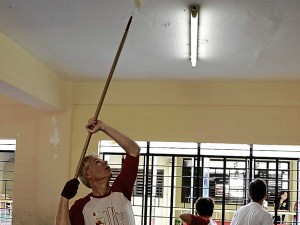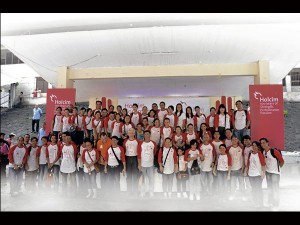Holcim puts sustainability concept into action
Cement maker Holcim Philippines Inc. is under no illusion that its operations have no impact on the environment.
They do, says Holcim Philippines chief operations officer Roland van Wijnen, because of the very nature of the complex process of transforming limestone, sand and other materials into cement, which the construction sector the world over can’t do without.
But what the local subsidiary of Swiss construction materials giant Holcim Ltd. has committed to do is to keep any adverse impact of its operations on the environment and the communities around its plants to a minimum, as it widens its lead in the competitive cement sector.
Sustainability is the operative word, says van Wijnen, and this is a corporate value that emanates from the mother company founded by Ernst Schmidheiny and Adolf Gygi in Switzerland in 1912.
There are many ways to define the concept of sustainability, which is said to be one of the world’s most talked about but least understood words.
But in Holcim’s dictionary, sustainability is referred to as a concept that “embraces the preservation of the environment as well as critical development-related issues such as the efficient use of resources, continual social progress, stable economic growth and the eradication of poverty.”
This means that for Holcim to be a good corporate citizen, it should not just take its plant sites and the communities around them into consideration in its corporate plans, but also the greater Filipino society, which has made Holcim the leading cement manufacturer and distributor in the Philippines, which repre sents Holcim’s first investment in Asia.
Concrete expressions of Holcim’s corporate commitment to sustainability include its participation in groups that espouse sustainable development, such as the International Chamber of Commerce and the World Business Council for Sustainable Development, and its setting up of the Holcim Foundation for Sustainable Construction in 2003 to raise the awareness of the important role that architecture, engineering and construction have in achieving an environment-friendly future.
Its sustainability concept also covers its commitment to engage the communities where it operates, particularly through corporate social responsibility projects that are focused on education, infrastructure and sustainable development.
For its 100th year, Holcim has adopted the theme “100 years of Strength. Performance. Passion.” and it plans to celebrate this by engaging its employees in doing work in the communities where the company operates.
This theme was translated in the Philippines into “Sagot ko ang Bukas,” an online company launched on March 26 to encourage its employees, partners and other Filipinos to make a personal pledge on how they can contribute to a better future.
The Sagot Ko and Bukas campaign is its contribution to making people better understand the concept of sustainability and bring it down to a personal level.
Individuals, for example, can publicly pledge through a microsite in its corporate website to segregate their waste, use a reusable shopping bag or reduce their use of plastic.
“With this campaign, Holcim plans to involve not just its 1,700 employees, but inspire more Filipinos to make a personal commitment to do something concrete for the benefit of tomorrow’s generation,” van Wijnen says.
In the same vein, almost 1,700 employees used company time last May 24 to go to communities in La Union, Bulacan, Taguig, Misamis Oriental and Davao to participate in various community service activities.
Holcim Philippines employees went to public schools near their facilities to clean and paint classrooms and tend gardens to help prepare these for opening of classes. Employees also held story telling sessions and road safety demonstrations for children there. The company also brought along dentists, doctors and barbers who provided free services to the children.
“These activities are Holcim’s way to give back to its communities which give us our company the license to operate,” says van Wijnen.


